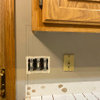advice on 1,500 ft. undergound?
nancyk
10 years ago
Related Stories

FARM YOUR YARDAdvice on Canyon Farming From L.A.'s Vegetable Whisperer
See how a screened garden house and raised beds help an edible garden in a Los Angeles canyon thrive
Full Story
SMALL KITCHENSThe 100-Square-Foot Kitchen: One Woman’s $4,500 DIY Crusade
Teaching herself how to remodel, Allison Macdonald adds function, smarter storage and snazzier materials
Full Story
SMALL HOMES16 Smart Ideas for Small Homes From People Who’ve Been There
Got less than 1,000 square feet to work with? These design-savvy homeowners have ideas for you
Full Story
ORGANIZINGProfessional Tips for Organizing Your Clothes Closet
As summer draws to a close, get expert advice on editing and organizing your wardrobe
Full Story
SELLING YOUR HOUSEThe Latest Info on Renovating Your Home to Sell
Pro advice about where to put your remodeling dollars for success in selling your home
Full Story
GREAT HOME PROJECTSWhat to Know About Adding a Reclaimed-Wood Wall
Here’s advice on where to put it, how to find and select wood, what it might cost and how to get it done
Full Story
REMODELING GUIDESHow to Protect (Even Enhance!) Your Relationship While Renovating
No home improvement project is worth a broken heart. Keep your togetherness during a remodel with this wise advice
Full Story
ADDITIONSParents' Places: Ideas for Integrating an In-Law Suite
Get expert advice and inspiration for adding a comfy extra living space to your home
Full Story
INSIDE HOUZZThere’s a Party in the Backyard, Says a Houzz Landscaping Survey
Entertaining, growing edibles and solving problems are goals for homeowners planning to revamp their yards
Full Story







bus_driver
petey_racer
Related Professionals
Salem General Contractors · Ashburn General Contractors · Asheboro General Contractors · Berkeley General Contractors · Delhi General Contractors · Highland City General Contractors · Mansfield General Contractors · Owosso General Contractors · Park Forest General Contractors · West Whittier-Los Nietos General Contractors · Quincy Solar Energy Systems · Tarpon Springs Solar Energy Systems · Homer Glen Solar Energy Systems · Asheville Home Automation & Home Media · Richardson Home Automation & Home MedianancykOriginal Author
glennsparky
glennsparky
bus_driver
nancykOriginal Author
glennsparky
dennisgli
GreenDesigns
nancykOriginal Author
GreenDesigns
countryboymo
countryboymo
countryboymo